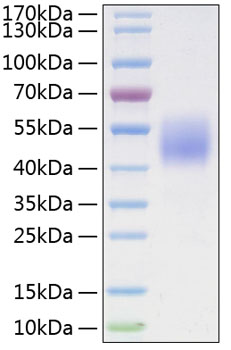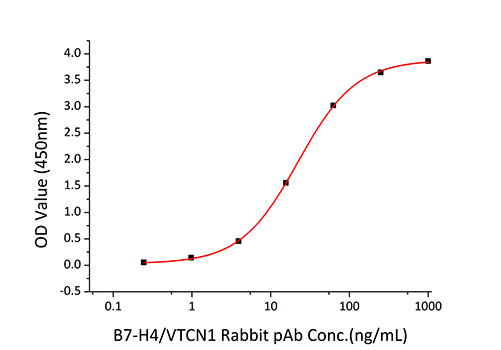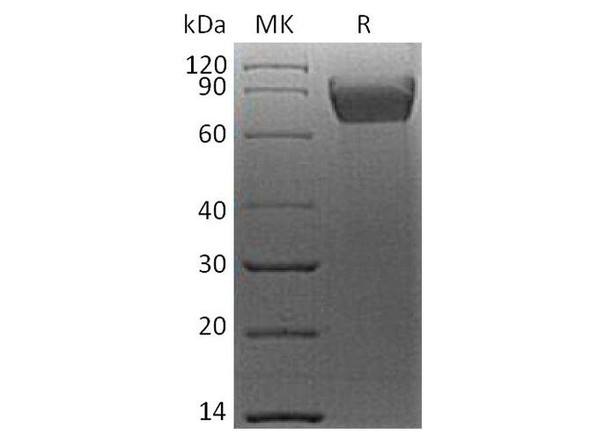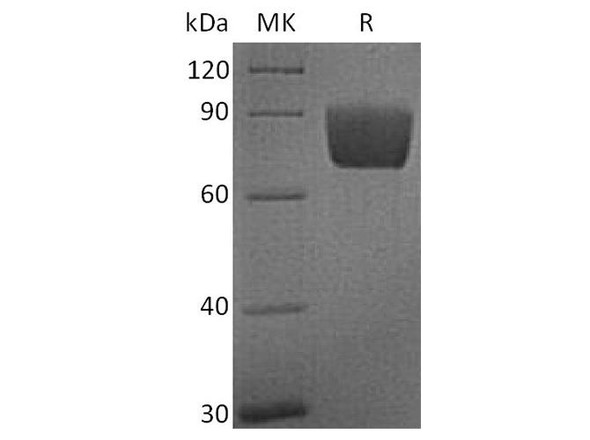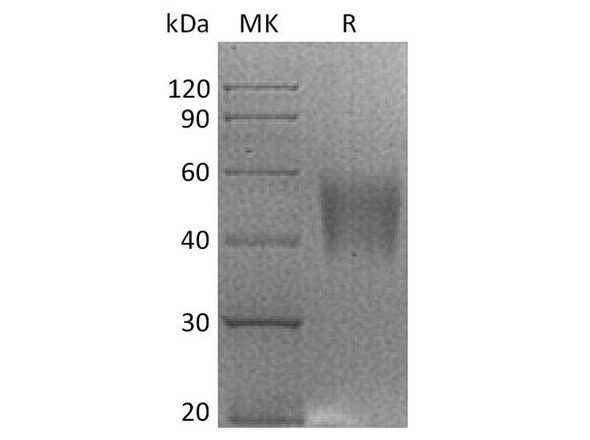Description
Recombinant Human B7-H4/VTCN1 Protein
The Recombinant Human B7-H4/VTCN1 Protein is a biologically active recombinant protein that plays a significant role in various cellular processes and signaling pathways in human biology. This protein is widely employed in immunological research, cell biology studies, protein-protein interaction analyses, and therapeutic development, providing researchers with a reliable tool for investigating B7-H4/VTCN1 function and its implications in health and disease.
This product (SKU: RPCB0272) is produced using HEK293 cells and features a C-His tag for convenient detection and purification. The protein exhibits a calculated molecular weight of 26.16 kDa with an observed molecular weight of 45-60 kDa under denaturing conditions, achieving ≥ 95 % as determined by SDS-PAGE.. Functional bioactivity has been validated through rigorous quality control assays, confirming its suitability for demanding research applications.
Key Features
| High Purity by Affinity Chromatography | |
| Mammalian & Bacterial Expression Systems | |
| High lot-to-lot consistency via strict QC |
| Product Name: | Recombinant Human B7-H4/VTCN1 Protein |
| SKU: | RPCB0272 |
| Size: | 10 μg , 20 μg , 50 μg , 100 μg |
| Reactivity: | Human |
| Synonyms: | VTCN1, B7-H4, B7H4, B7S1, B7X, B7h.5, PRO1291, VCTN1 |
| Tag: | C-His |
| Expression Host: | HEK293 cells |
| Calculated MW: | 26.16 kDa |
| Observed MW: | 45-60 kDa |
| Gene ID: | 79679 |
| Protein Description: | High quality, high purity and low endotoxin recombinant Recombinant Human B7-H4/VTCN1 Protein (RPCB0272), tested reactivity in HEK293 cells and has been validated in SDS-PAGE.100% guaranteed. |
| Endotoxin: | < 0.1 EU/μg of the protein by LAL method. |
| Purity: | ≥ 95 % as determined by SDS-PAGE. |
| Formulation: | Lyophilized from a 0.22 μm filtered solution of PBS, pH 7.4.Contact us for customized product form or formulation. |
| Bio-Activity: | Measured by its binding ability in a functional ELISA.Immobilized Mouse B7-H4/VTCN1/VISTA (RPCB0272) at 1 μg/mL (100 μL/well) can bind B7-H4/VTCN1 Rabbit pAb with a linear range of 0.2-22 ng/mL. |
| Reconstitution: | Centrifuge the vial before opening. Reconstitute to a concentration of 0.1-0.5 mg/mL in sterile distilled water. Avoid vortex or vigorously pipetting the protein. For long term storage, it is recommended to add a carrier protein or stablizer (e.g. 0.1% BSA, 5% HSA, 10% FBS or 5% Trehalose), and aliquot the reconstituted protein solution to minimize free-thaw cycles. |
| Storage: | Store at -20℃.Store the lyophilized protein at -20℃ to -80 ℃ up to 1 year from the date of receipt. After reconstitution, the protein solution is stable at -20℃ for 3 months, at 2-8℃ for up to 1 week. |
B7 homolog 4 (B7-H4, VTCN1) is a member of the B7 family of cell surface ligands that regulate T cell activation and immune responses.B7-H4 is expressed on the surface of activated lymphocytes, macrophages, monocytes, dendritic cells, epithelial cells, and bone marrow-derived mesenchymal stem cells. Its binding to activated T cells dampens T cell responses and induces cell cycle arrest in the T cell.The B7-H4 protein is also found in ovarian cancer, breast cancer, renal cell carcinoma, and rheumatoid arthritis patients.Research studies indicate that B7-H4 protein is present on the surface of ovarian tumor cells, and that targeted inhibition of B7-H4 using recombinant antibodies restores T cell activation pathways. These studies suggest some potential therapeutic value in blocking B7-H4 function and restoring T cell function in cancer patients.


